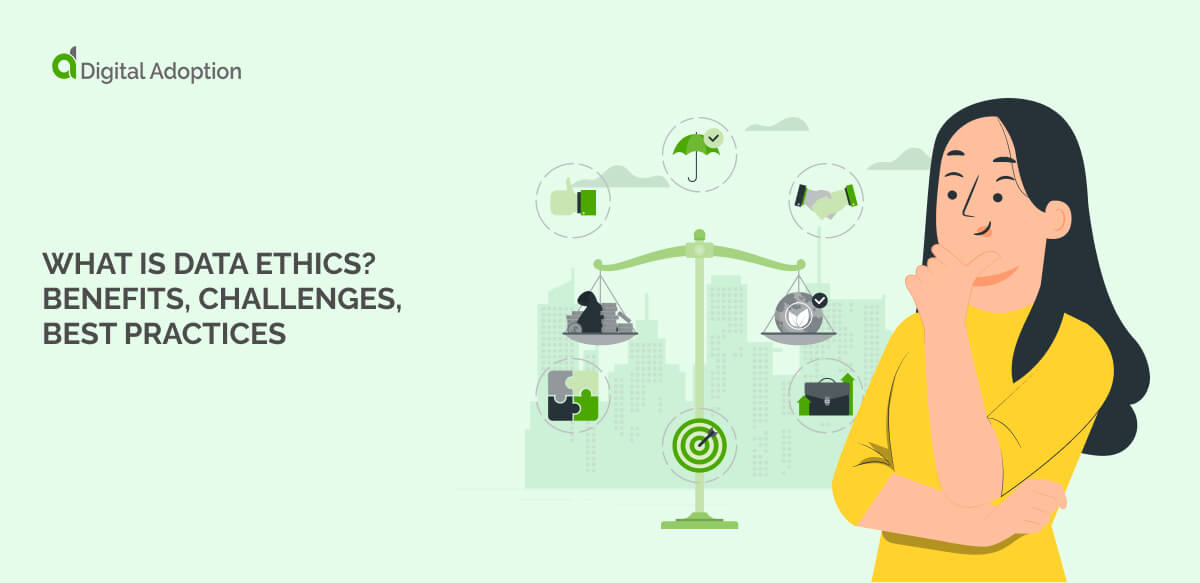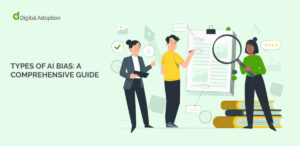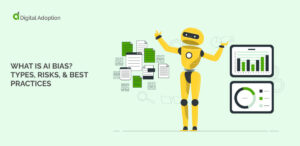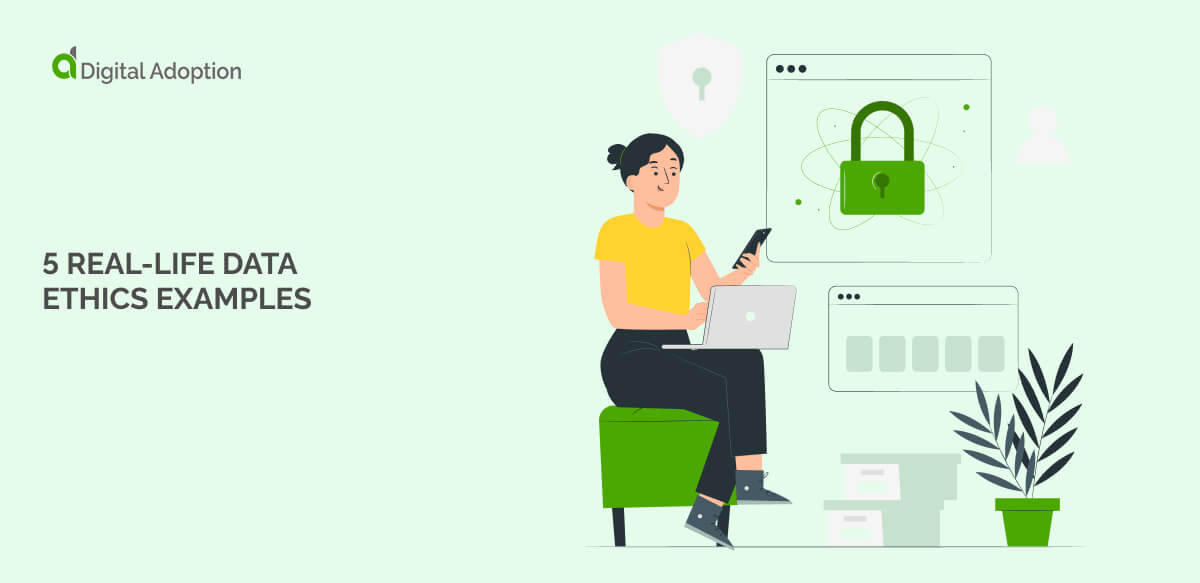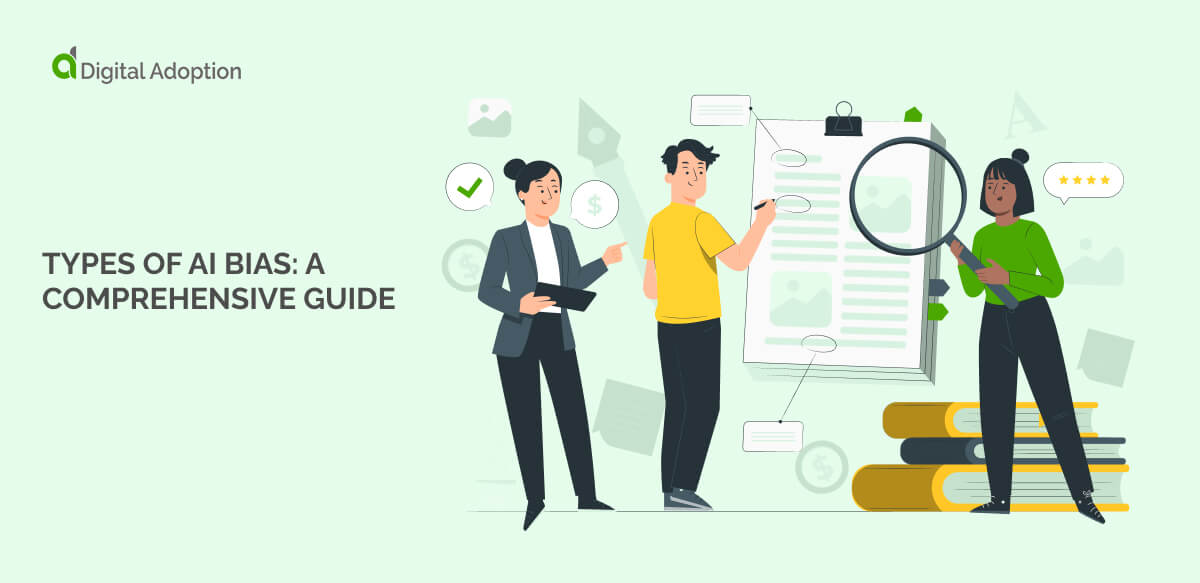AI adoption in enterprises leverages data to reveal hidden patterns and make predictions that reshape business strategies. However, the sensitivity of this information cannot be ignored. Personally identifiable information (PII) is often embedded in datasets, and if misused, the consequences can be severe.
Data ethics addresses these risks by examining the moral and ethical responsibilities of handling data.
This article explores data ethics, its importance, and the key principles enterprises must follow. We’ll also explore the benefits and challenges of introducing data ethics and best practices that can help organizations remain risk-free.
What is data ethics?
Data ethics is a way of understanding and addressing the moral and ethical implications of how data is collected, stored, and used. It establishes principles and frameworks that address ethical uncertainties, particularly in handling personal information.
It works to define clear distinctions between acceptable and unacceptable data practices, focusing on minimizing harm to individuals, groups, and society. Data ethics is an overarching concept that brings together ethical frameworks, AI compliance obligations, and strict codes of conduct.
It prompts those involved in data projects to follow principles that keep data use fair, transparent, and explainable. Ethical data practices help prevent bias, misuse, and breaches while reinforcing accountability in AI and digital transformation efforts.
Why is data ethics important?
In the age of big data adoption, ethical considerations arise due to the size and complexity of available data today.
Businesses handle huge amounts of personal data, from sensitive customer details to critical operational records. Whether collected directly or through third parties, personal data requires a clear understanding of permissions regarding how it is processed, stored, and used.
With AI advancing, data ethics has become even more pressing. Computers now operate with minimal human oversight, raising risks. Training data must maintain integrity to prevent bias and discriminatory outputs. Generative AI applications can also leak information to threat actors with the right prompt. Employees entering sensitive data into AI business models adds another layer of risk.
A breach of these systems could expose entire datasets. Cross-departmental collaboration, from entry-level employees to managers to C-suite executives, has a responsibility to demonstrate ethical data practices in their work.
Those handling data must understand the importance of keeping data secure and private. Being transparent about how data is collected, used, and stored is integral to building digital trust and protecting the organization.
What are the principles of data ethics?
A few key principles have been introduced to help ensure that ethical data practices are easy to achieve and understand.
These pillars act as guidestones for AI-first organizations and embody the overarching values of data ethics:
Transparency
Transparency means being open about how data is collected, used, and shared. Organizations must clearly explain their methods and intentions behind data processing. This builds trust and ensures users understand how their information is handled.
Fairness
Fairness requires that data is used without bias or discrimination. Everyone should be treated equally, with no group or individual facing unjust treatment. This ensures data practices are just and reflect society’s diverse needs.
Ownership
Data ownership establishes who controls and is responsible for data. Individuals should have rights over their information, knowing how it’s used and when they can access or delete it. This empowers personal control and responsibility.
Privacy
Privacy protects individual information from unauthorized access or exposure. People must be informed about how their data is stored and shared, and measures should be in place to safeguard sensitive data and prevent misuse.
Intention
Intention refers to the reason behind collecting and using data. Organizations must have a clear purpose that aligns with ethical guidelines. Data should not be collected for misleading or harmful purposes but rather to serve transparent and fair objectives.
Outcomes
Outcomes focus on the impact of data use on society and individuals. Data should not cause harm or unintended consequences. Ethical practices involve anticipating and monitoring the results to ensure positive, responsible outcomes.

What are the benefits of data ethics?
Ensuring strong data ethics can be a long and tricky process for organizations handling large amounts of data. This is especially true for firms embarking on digital transformation and using that data in new and novel ways.
When done right, however, reliable data ethics standards can drive business transformation while ensuring that data is used in a way that works for everyone.
Here’s a look at a few other benefits of ethical data:
Increased customer trust and profitability
When companies follow data ethics, customers trust them more. Being clear about how data is used makes customers feel secure. This trust leads to more loyalty, and loyal customers are more likely to keep buying from the business, which increases profits.
Demonstrates fair practices
Data ethics show that a company values fairness. They use data in ways that treat everyone equally. Customers notice when businesses make sure no one is left out or unfairly treated, and this fairness makes people want to keep doing business with them.
Ensures adherence to regulations and compliance requirements
Having strong data ethics helps companies follow rules about data protection. Laws like The General Data Protection Regulation (GDPR) or the California Consumer Privacy Act (CCPA) set clear guidelines for handling data. By following these rules, businesses avoid fines and stay on the right side of the law.
Safeguards enterprise reputation
A business known for using data responsibly builds a solid reputation. Ethical practices prevent data scandals that could harm the company’s image. A good reputation attracts customers and keeps strong, long-term partnerships.
What are the challenges of data ethics?
Introducing proper data ethics can be difficult for businesses.
Creating mechanisms that protect privacy and ensure fairness presents many challenges. These issues make it difficult for companies to meet data ethics standards.
Let’s take a look at some of the top barriers:
Ensuring data privacy and security
Protecting data is a significant challenge. Sensitive customer information must be kept safe from threat actors and leaks. Companies need strong security systems to prevent unauthorized access. As data grows, so does the risk of exposure, making it important to remain vigilant with routine updates and proactive security measures.
Underestimating the importance of data ethics
Some businesses don’t fully understand the value of data ethics. In a rush to adopt AI, they might focus more on profits than treating customer data fairly. This can lead to careless practices that harm trust. Without a commitment to good data ethics, companies risk damaging their reputation and breaching compliance.
Dismantling cross-departmental silos
For robust data ethics, cross-departmental teamwork between IT, marketing, and legal is non-negotiable. However, many companies have no strategy for connecting to these teams. When departments don’t work together, and silos occur, ethical practices can fall through the cracks. Breaking down these silos is necessary to ensure everyone is working toward the same standards.
Failing to check data integrity
Subpar data integrity can jeopardize decision-making. When companies don’t ensure that data is accurate and clean, they risk making choices based on skewed or incomplete information. Data needs to be carefully managed to ensure it’s reliable and unbiased, which will mitigate mistakes in business operations.
What are some best practices for enterprises implementing data ethics?

Data ethics is important because it helps companies handle information fairly and responsibly.
When businesses follow good data ethics, they keep personal data safe and avoid bias. This enhances trust, prevents issues, and allows the company to innovate safely. It also involves employee training and regularly checking that everything is done ethically.
A McKinsey survey showed that 27% of companies using generative AI ensure employees review AI-created content before it’s used. This helps catch any mistakes or prejudice, guaranteeing fair and trustworthy decisions.
Below, we’ve outlined common best practices enterprises should take when implementing AI ethics:
Establish robust frameworks for data use at your company
Rules on how data is used help the company stay organized and fair. These rules ensure that everyone knows how to handle information responsibly and keep it safe. Having a strong plan also shows customers you respect their privacy and are serious about using data ethically.
Communicate your data principles across all levels
Everyone in the company should know the rules for handling data, not just the leaders. When employees at every level understand how to use data responsibly, it creates a culture of trust. Regular reminders and training help keep these rules fresh in everyone’s mind.
Nurture data-devoted teams
Building teams that care about data ethics is key. These teams focus on ensuring that the data is used fairly and responsibly. Having experts who check the company’s practices means businesses can ensure they avoid mistakes and always adhere to ethical standards.
Measure long-term data impacts
It’s important to consider how using data might affect people in the future. By examining the long-term impact, companies can spot problems early and fix them. This helps ensure the business stays honest and respectful of privacy as it grows over time.
What is the future of data ethics?
As AI expands its role in business and society, the future of data ethics will become more pressing.
Data for training AI models cannot be handled carelessly or without scrutiny. Enterprises must rigorously audit the data they collect, ensuring its use meets ethical guidelines. Data must be protected from misuse, and privacy should be a constant focus.
Responsibility will extend beyond businesses to governments, markets, and civil society. Each entity must promote and adhere to ethical data practices locally and internationally. As data volume and complexity increase, current laws must be adjusted, and new regulations must be introduced.
These laws must address challenges like AI accountability, transparency, and personal data protection. Data ethics will require constantly balancing technological progress and protecting individuals’ rights.
People Also Ask
-
What risks arise from ignoring data ethics?Ignoring data ethics can lead to serious issues like privacy breaches and misuse. Companies may face fines or legal action. It also damages trust with customers. If AI systems are built on biased data, they can make unfair decisions, harming the company’s reputation.
-
How do data ethics shape AI and machine learning?Data ethics ensure that AI and machine learning are fair and transparent. They prevent AI from using biased data, which could lead to unfair results. Ethical practices also keep AI systems accountable, protect privacy, and use them responsibly.
-
How can data ethics build customer trust?When companies follow data ethics, customers know their information is safe. Being clear about how data is used builds trust. Customers feel more secure knowing their data is protected and handled carefully, making them more likely to trust the company.

